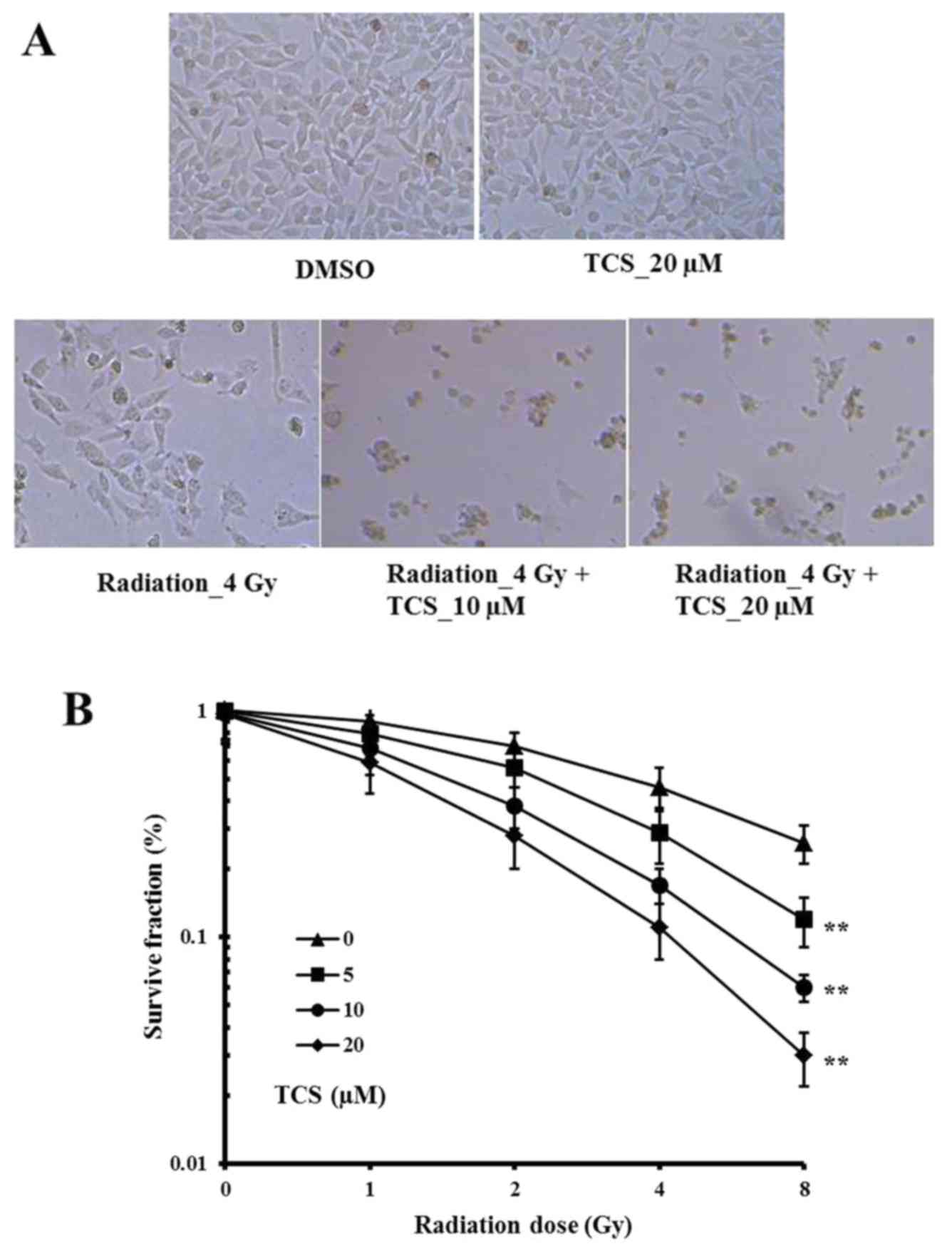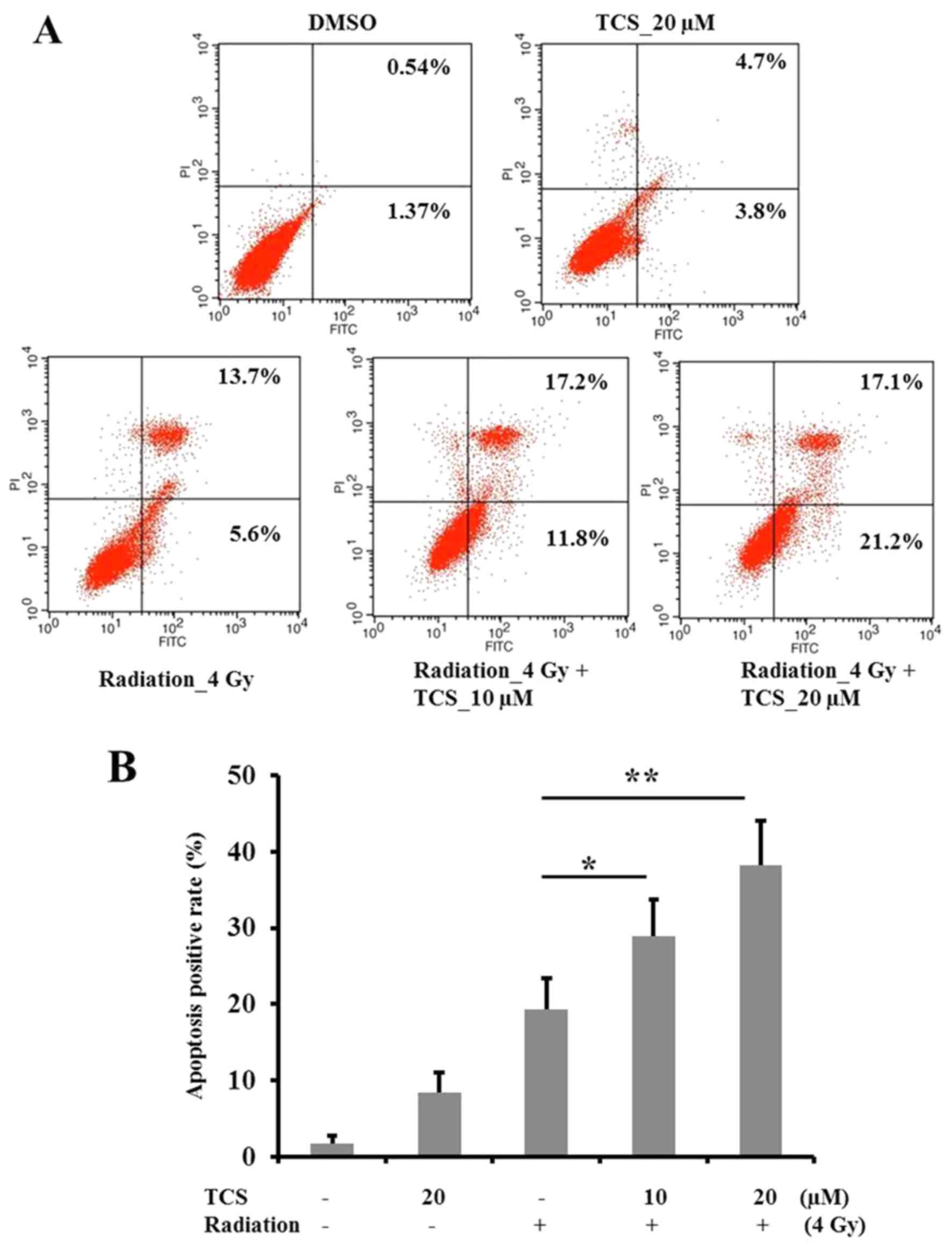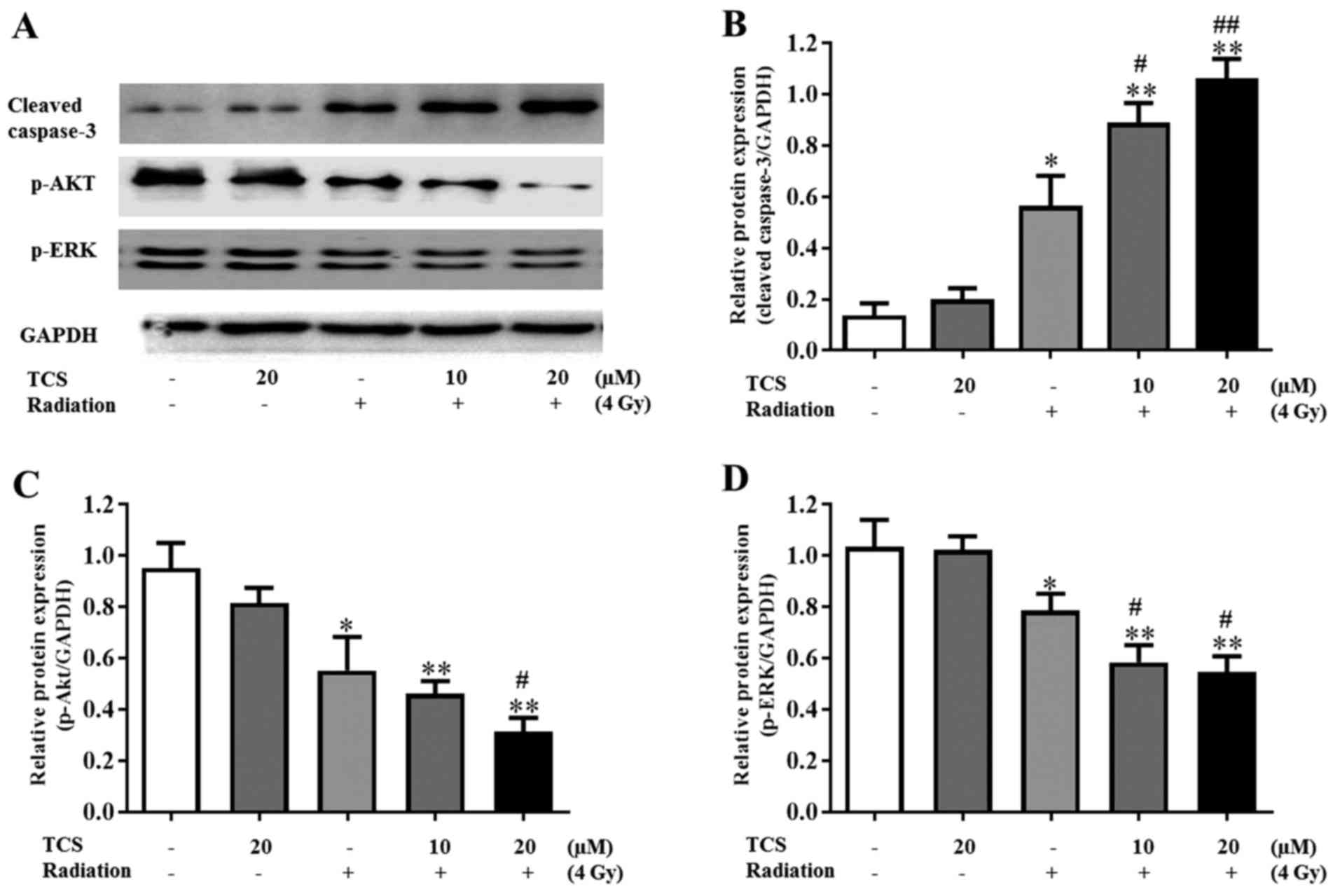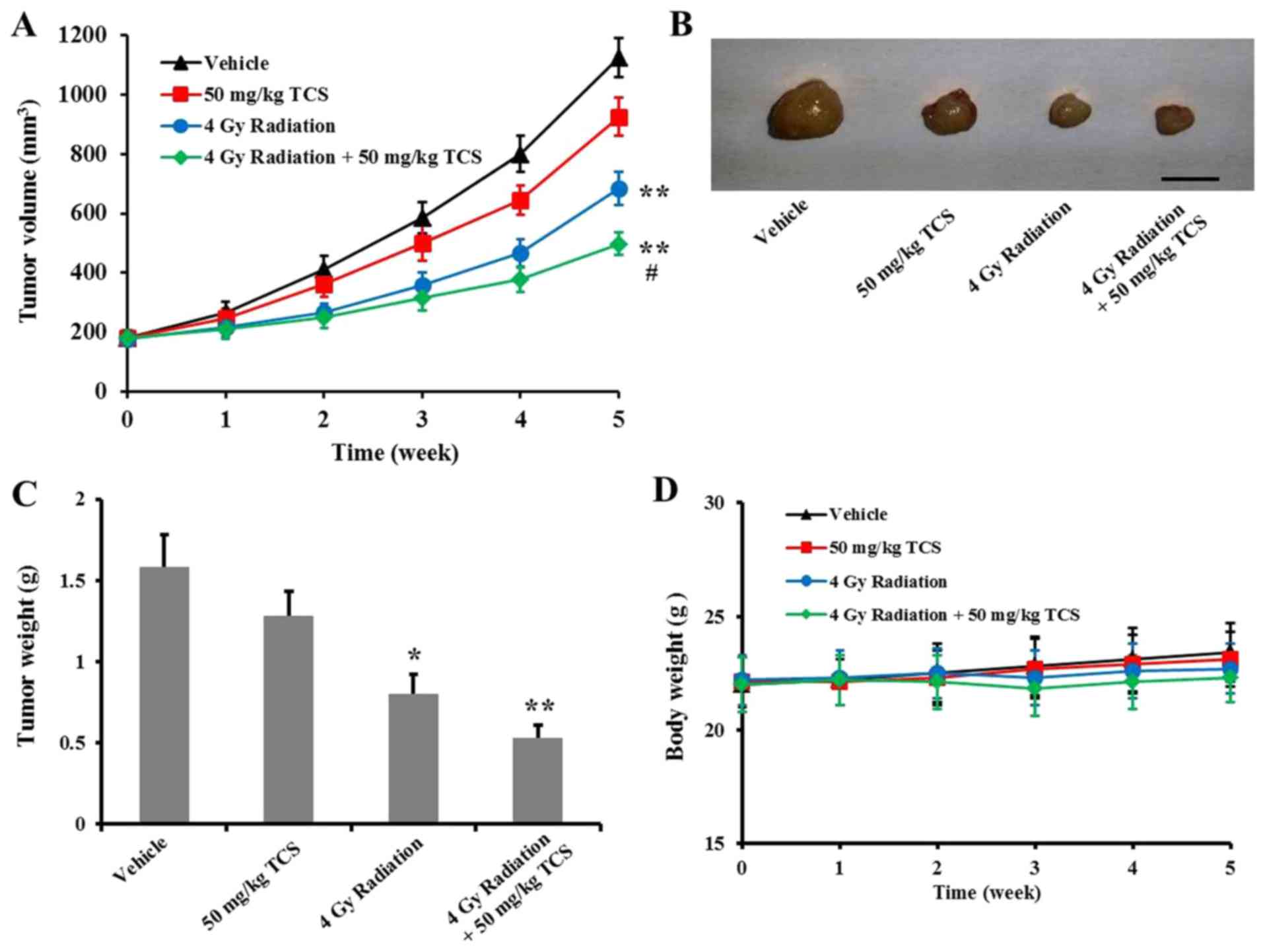|
1
|
Wei B, Huang Q, Huang S, Mai W and Zhong
X: Trichosanthin-induced autophagy in gastric cancer cell MKN-45 is
dependent on reactive oxygen species (ROS) and NF-κB/p53 pathway. J
Pharmacol Sci. 131:77–83. 2016. View Article : Google Scholar : PubMed/NCBI
|
|
2
|
Li J, Li H, Zhang Z, Wang N and Zhang Y:
The anticancerous activity of recombinant trichosanthin on prostate
cancer cell PC3. Biol Res. 49:212016. View Article : Google Scholar : PubMed/NCBI
|
|
3
|
Sha O, Niu J, Ng TB, Cho EY, Fu X and
Jiang W: Antitumor action of trichosanthin, a type 1
ribosome-inactivating protein, employed in traditional Chinese
medicine: A mini review. Cancer Chemother Pharmacol. 71:1387–1393.
2013. View Article : Google Scholar : PubMed/NCBI
|
|
4
|
Miao J, Jiang Y, Wang D, Zhou J, Fan C,
Jiao F, Liu B, Zhang J, Wang Y and Zhang Q: Trichosanthin
suppresses the proliferation of glioma cells by inhibiting LGR5
expression and the Wnt/β-catenin signaling pathway. Oncol Rep.
34:2845–2852. 2015. View Article : Google Scholar : PubMed/NCBI
|
|
5
|
Fang EF, Zhang CZ, Zhang L, Wong JH, Chan
YS, Pan WL, Dan XL, Yin CM, Cho CH and Ng TB: Trichosanthin
inhibits breast cancer cell proliferation in both cell lines and
nude mice by promotion of apoptosis. PLoS One. 7:e415922012.
View Article : Google Scholar : PubMed/NCBI
|
|
6
|
Makowska A, Eble M, Prescher K, Hoss M and
Kontny U: Chloroquine sensitizes nasopharyngeal carcinoma cells but
not nasoepithelial cells to irradiation by blocking autophagy. PLoS
One. 11:e01667662016. View Article : Google Scholar : PubMed/NCBI
|
|
7
|
Lu QP, Chen WD, Peng JR, Xu YD, Cai Q,
Feng GK, Ding K, Zhu XF and Guan Z: Antitumor activity of 7RH, a
discoidin domain receptor 1 inhibitor, alone or in combination with
dasatinib exhibits antitumor effects in nasopharyngeal carcinoma
cells. Oncol Lett. 12:35988–36008. 2016. View Article : Google Scholar
|
|
8
|
Wen X, Tang X, Li Y, Ren X, He Q, Yang X,
Zhang J, Wang Y, Ma J and Liu N: Microarray expression profiling of
long non-coding RNAs involved in nasopharyngeal carcinoma
metastasis. Int J Mol Sci. 17:E19562016. View Article : Google Scholar : PubMed/NCBI
|
|
9
|
Qi G, Chen J, Shi C, Wang Y, Mi S, Shao W,
Yu X, Ma Y, Ling J and Huang J: Cinnamic acid (CINN) induces
apoptosis and proliferation in human nasopharyngeal carcinoma
cells. Cell Physiol Biochem. 40:589–596. 2016. View Article : Google Scholar : PubMed/NCBI
|
|
10
|
Yi W, Liu ZG, Li X, Tang J, Jiang CB, Hu
JY, Tu ZW, Wang H, Niu DL and Xia YF: CT-diagnosed severe skull
base bone destruction predicts distant bone metastasis in early
N-stagenasopharyngeal carcinoma. Onco Targets Ther. 9:7011–7017.
2016. View Article : Google Scholar : PubMed/NCBI
|
|
11
|
Chou TC: Drug combination studies and
their synergy quantification using the Chou-Talalay method. Cancer
Res. 70:440–446. 2010. View Article : Google Scholar : PubMed/NCBI
|
|
12
|
Zhang YH, Wang Y, Yusufali AH, Ashby F,
Zhang D, Yin ZF, Aslanidi GV, Srivastava A, Ling CQ and Ling C:
Cytotoxic genes from traditional Chinese medicine inhibit tumor
growth both in vitro and in vivo. J Integr Med. 12:483–494. 2014.
View Article : Google Scholar : PubMed/NCBI
|
|
13
|
Lu ZX, Ma XQ, Yang LF, Wang ZL, Zeng L, Li
ZJ, Li XN, Tang M, Yi W, Gong JP, et al: DNAzymes targeted to
EBV-encoded latent membrane protein-1 induce apoptosis and enhance
radiosensitivity in nasopharyngeal carcinoma. Cancer Lett.
265:226–238. 2008. View Article : Google Scholar : PubMed/NCBI
|
|
14
|
Chan AT and Felip E; ESMO Guidelines
Working Group, : Nasopharyngeal cancer: ESMO clinical
recommendations for diagnosis, treatment and follow-up. Ann Oncol.
20 Suppl 4:S123–S125. 2009. View Article : Google Scholar
|
|
15
|
Suarez C, Rodrigo JP, Rinaldo A,
Langendijk JA, Shaha AR and Ferlito A: Current treatment options
for recurrent nasopharyngeal cancer. Eur Arch Otorhinolaryngol.
267:1811–1824. 2010. View Article : Google Scholar : PubMed/NCBI
|
|
16
|
Wang S, Zhang R, Claret FX and Yang H:
Involvement of microRNA-24 and DNA methylation in resistance of
nasopharyngeal carcinoma to ionizing radiation. Mol Cancer Ther.
13:3163–3174. 2014. View Article : Google Scholar : PubMed/NCBI
|
|
17
|
Mo N, Lu YK, Xie WM, Liu Y, Zhou WX, Wang
HX, Nong L, Jia YX, Tan AH, Chen Y, et al: Inhibition of autophagy
enhances the radiosensitivity of nasopharyngeal carcinoma by
reducing Rad51 expression. Oncol Rep. 32:1905–1912. 2014.
View Article : Google Scholar : PubMed/NCBI
|
|
18
|
Fan HN, Shao M, Huang S, Liu Y, Liu J,
Wang Z, Diao J, Liu Y, Tong LI and Fan Q: MiR-593 mediates
curcumin-induced radiosensitization of nasopharyngeal carcinoma
cells via MDR1. Oncol Lett. 11:3729–3734. 2016. View Article : Google Scholar : PubMed/NCBI
|
|
19
|
Liu T, Sun Q, Li Q, Yang H, Zhang Y, Wang
R, Lin X, Xiao D, Yuan Y, Chen L and Wang W: Dual PI3K/mTOR
inhibitors, GSK2126458 and PKI-587, suppress tumor progression and
increase radiosensitivity in nasopharyngeal carcinoma. Mol Cancer
Ther. 14:429–439. 2015. View Article : Google Scholar : PubMed/NCBI
|


















